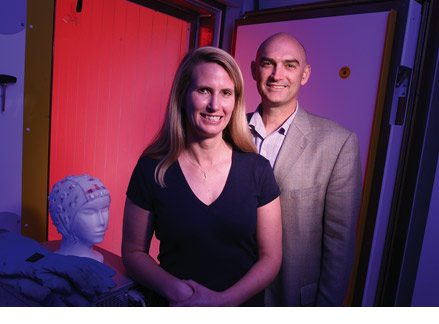


Big BIRC On Campus
by Rebecca Ayer
Intro
|
Improving Prospects
|
Not Only the Brain
|
Advancing the State of the Art

![]()
“Cat Scan” Reveals
Brain Tumors
Training a New Generation of Scientists

Intro
UGA's bioimaging research center, with an exceptional array of technology and talent under one roof, seeks to illuminate the workings of human (and animal) mind and matter.
Since 1665, when Robert Hooke published his historic book, Micrographia and introduced the microscope, scientists have appreciated the supreme importance of being able to see what cannot be seen with the naked eye. They have steadily worked to deepen their knowledge through tissue imaging—and to advance the technology itself.
With the opening of the state-of-the-art Bioimaging Research Center (BIRC) in January 2007, the University of Georgia committed itself to furthering this tradition of scientific discovery and technological innovation. Located in the north wing of the Paul D. Coverdell Center for Biomedical and Health Sciences, the BIRC represents the newest addition to the university’s rapidly expanding biomedical research profile.
At the heart of BIRC’s 9,000-square-foot suite is its new $2.3-million magnetic resonance imaging (MRI) system. A powerful tool for discovering details on how the brain and body work, this 3-Tesla magnet—twice as strong as the MRI machines typically used for patient care—offers to UGA researchers a number of imaging capabilities previously unavailable on campus. These include structural MRI for highly detailed images of brain, muscle, and bone tissue, functional neuroimaging (fMRI) for real-time studies of the working brain, and magnetic resonance spectroscopy (MRS) for measuring changes in the body’s biochemical processes.

Jennifer McDowell and Brett Clementz direct the Clinical and Cognitive Neuroscience Laboratory in UGA’s Department of Psychology. Their work has led the way in multi-modal neuroimaging research at UGA. [Photo by Terry Allen]
Moreover, BIRC offers magnetoencephalography (MEG) and high-density-array electroencephalography (EEG)—two functional imaging techniques that allow for investigation into the workings of the brain at the very moment that thought occurs.
Brett Clementz, a UGA professor of psychology who also directs the bioimaging center’s EEG/MEG laboratory, points out that this integration of magnetic resonance, EEG, and MEG technologies puts the University on the map as a center for multi-modal neuroimaging.
“Few other centers in the United States, or even the world, can do this kind of work because they lack a research-dedicated facility that offers these technologies next door to each other,” said Clementz. “It will position UGA investigators to do cutting-edge work as well as attract individuals from other institutions interested in collaborative science.”
UGA had already attracted Clementz and his wife Jennifer McDowell, also a psychology faculty member, even when the BIRC was still in the conceptual stages. In 2002, the husband-and-wife team left the University of California, San Diego, to take advantage of UGA’s growing opportunities and expanding resources in neuroimaging. They brought expertise in schizophrenia research to the department, as well as significant experience in all three of the major imaging techniques now offered at the BIRC.
“Different types of imaging techniques have different strengths,” said McDowell. “Functional MRI is very good at providing accurate spatial resolution or determining what areas of the brain are actively engaged in a given task. MEG and EEG have excellent temporal resolution—that is, they reveal how brain activity changes on a millisecond-by-millisecond basis.” Used together, she said, these methods may illuminate the integrated workings of the living brain.
Intro
|
Improving Prospects
|
Not Only the Brain
|
Advancing the State of the Art
For comments or for information please e-mail: rcomm@uga.edu
To contact the webmaster please email: ovprweb@uga.edu
![]()